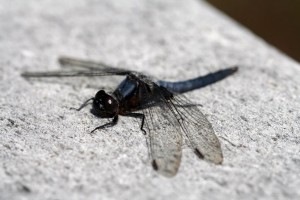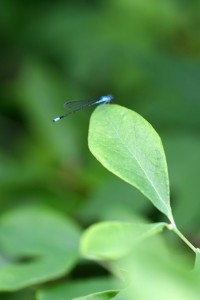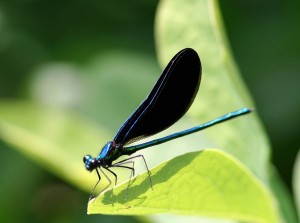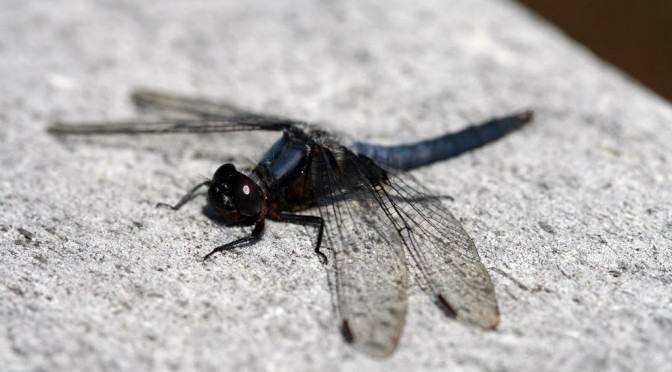I won’t pretend to know what I’m talking about here, so take anything I say with a grain of salt! I find dragonflies and damselflies to be a nice distraction when there’s not much else to look at and an integral part of any streamside, pondside, or bog experience. Identifying them is quite a challenge, but I pay the most attention to their differing behaviors and flight styles. I found this Blue Corporal dragonfly at Webb’s Mill early in the spring; in fact I think they are one of the first you might find flying in the Pine Barrens. They seem very territorial and like to perch on the ground.
I found this Blue Corporal dragonfly at Webb’s Mill early in the spring; in fact I think they are one of the first you might find flying in the Pine Barrens. They seem very territorial and like to perch on the ground. I wouldn’t even atempt to ID this bluet; they’re so tiny that even seeing them clearly is a challenge! Bluets are damselflies; they rest with their wings closed and have very thin bodies.
I wouldn’t even atempt to ID this bluet; they’re so tiny that even seeing them clearly is a challenge! Bluets are damselflies; they rest with their wings closed and have very thin bodies. This is a beauty of a damselfly from yesterday at Webb’s Mill Bog – I’m calling it an Ebony Jewelwing because I don’t know any better. Unlike a bluet, this damselfly was hard to miss as it flew butterfly-like along the path ahead of me. While its’ body looks mostly blue in this pic, it also looked green when the sunlight hit it at a different angle. Really stunning! I also saw a similar-looking brownish damselfly, which I assume is the female.
This is a beauty of a damselfly from yesterday at Webb’s Mill Bog – I’m calling it an Ebony Jewelwing because I don’t know any better. Unlike a bluet, this damselfly was hard to miss as it flew butterfly-like along the path ahead of me. While its’ body looks mostly blue in this pic, it also looked green when the sunlight hit it at a different angle. Really stunning! I also saw a similar-looking brownish damselfly, which I assume is the female.
A great book I’ve recommended in the past is the Stokes’ Beginner’s Guide to Dragonflies – it’s by no means extensive, but a beginner like me doesn’t need the added confusion of a complete guide.
I’ve also had the experience of dragonflies laying eggs in my backyard pond and often come across the nymphs when doing pond maintenance or cleaning out the skimmer. I wish I had pics to share with you because they are so interesting to look at. I’m not sure what exactly the nymphs find to eat out there, but I wouldn’t be surprised to learn that they prey on goldfish fry.

If it’s big it’s a dragonfly if it’s small it’s a damselfly … that is the extent of my classification of these guys, but I do enjoy watching them. Last week tubing on a local river, I had a blue damselfly land on my knee and ride with me.
The nymphs will take small fish.
I don’t know much, either, Laura, but I agree with Floridacracker. Mon@rch knows a lot and “The Green Fingered Photographer” from GB (Mark) is an expert, too:
http://dragonsanddamsels.com/
You can follow this link to his blog.
I haven’t had much success with getting photos of them but I’ve seen them quite often. They don’t “sit and stay” when I want them to… LOL! You have more patience than I!
Lovely! I’m not ready to start id-ing them but I always smile when I see them. Amazing creatures.
Your photos are amazing – ever think about trying to publish a collection. I’d buy a book for the coffee table:)
Their are two books out their that I strongly suggest! Field Guide to the Dragonflies and Damselflies of Massachusetts for $20 at http://www.mass.gov/dfwele/dfw/nhesp/nhpubs.htm and is that book would allowed you to identify that bluet (in the hand). It is really a must for any dragonfly hunter in the north east. Stokes is a great guide but this is my suggestion when your ready for more details on each dragonfly/damselfly species.
If I add one more field guide to my shelf it will collapse! I’ve never been able to photograph gragonflies but they sure are fun to watch hunting along Hasty Brook in the summer. I think I’ve seen those nymphs in my little pond too- kind of creepy looking I think.
Definitely an Ebony Jewelwing. I love the Stokes Book and the book Monarch recommends is the next step up. Those damsels are very tough. There are Pine Barrens Bluets at Webb’s Mill, but this isn’t one of them. They are endemic to that type of habitat, which is pretty cool.
OK–what you know is MILES ahead of what I know on this subject. I would probably say–oh, look, there’s an insect. That’s it. . .the extent of my knowledge on dragonflies or damselflies.
It’s always good to “stretch out with your feelings” and look at and try to ID things besides what we know for sure. Any dragonfly, flower, cloud, deer, or whatever info you have to pass on is always welcome!
I didn’t know those little blue-tipped guys were damselflies, much less bluets. Thanks for the info! We have lots of them from the marsh and the creek.
I like your photos, Laura, but then I find dragon and damseflies very interesting. Sounds like the Pine Barrens would be an ideal place to see them.
Your photos are beautiful Laura! I tried to macro a damelsfly one day and it was tough – they’re so thin it’s hard for me to focus the camera on them.
Great photos! These critters just won’t hold still for me. I’m having trouble with the ID’s but I like the names. They’re just so colorful. I mean words like ‘damsel, jewel, meadow hawk’. I’ll have to get that Stokes book.
Nice photos of “dragons”! Both the nymphs and the adults eat other animals – insects and otherwise… When with a school group, I actually watched a dragonfly nymph eat a minnow! Wow.